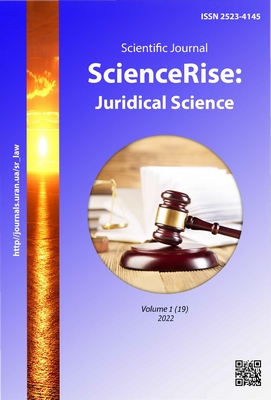Constitutional-legal aspects of information security in the context of globalization
DOI:
https://doi.org/10.15587/2523-4153.2022.253823Keywords:
globalization, challenges, threats, information and communication technologies, analysis, information, securityAbstract
One of the main issues of world politics since the 21st century is a scientific and technological breakthrough that can have far-reaching consequences in all areas of human activity. The computerization and information revolution have led to scientific and technological progress in the military field. The application of high technology has radically changed the nature and capabilities of conventional armaments, intelligence and military command systems, and expanded the possibilities of long-distance warfare. Today, the tactics of creating conflicts in many military and other fields with the help of information technology are changing in the world. Who controls information and misinformation plays an important role. Sometimes misinformation becomes a dangerous weapon. Although the existing terms "Information Security" and "Information War" are more commonly used in the military field, they are beginning to take on a slightly different meaning with the development of mass media and communication technologies. This article identifies the legal characteristics and legal specifics of the information rights of citizens, proclaimed by the Constitution of Azerbaijan. The article substantiates the need to consider the constitutional and legal foundations of information security as a complex political and legal phenomenon. It is proposed to analyze the constitutional and legal aspects of information security in the synthesis of constitutional ideology, constitutional theory and constitutional practice of the development of Azerbaijani statehood. The author proves that the constitutional legal provision of the information security of Azerbaijan considers positive international experience in this field
References
- Boury, P.-M. (2006). Does the European Union need a securities and exchange commission? Capital Markets Law Journal, 1 (2), 184–194. doi: http://doi.org/10.1093/cmlj/kml013
- Luciano, F. (2014). Protection of Information and the Right to Privacy – A New Equilibrium? Springer. doi: https://doi.org/10.1007/978-3-319-05720-0
- Zorkin, V. (2007). Sudebnaia zashchita mezhdu globalizatciei i suverenitetom. Rossiiskaia gazeta, 153. Available at: www.rg.ru/2007/07/18/zorkin
- Nurmagambetov, R. (2017). Obshchaia kharakteristika funktcii konstitutcionnogo regulirovaniia obshchestvennykh otnoshenii. Sovremennoe pravo, 3, 25–28.
- Baranovskii, V. G., Bogaturov, A. D. (Eds.) (2010). Sovremennye globalnye problemy. Moscow: Aspekt Press, 350.
- İnformasiya, informasiyalaşdırma və informasiyanın mühafizəsi haqqında Azərbaycan Respublikasinin Qanunu. Available at: http://www.e-qanun.az/framework/3525
- Əliyev, M. (2020). İnformasiya təhlükəsizliyi və dövlət maraqları. Available at: https://mod.gov.az/az/pre/31091.html
- Ilham Aliyev congratulated people of Azerbaijan on the launch of Azerspace-2 satellite. Available at: https://president.az/en/articles/view/30103
- Vseobshchaia deklaratciia prav cheloveka (1948). Available at: https://www.un.org/ru/documents/decl_conv/declarations/declhr.shtml
- Zakon Azerbaidzhanskoi Respubliki O natcionalnoi bezopasnosti (2004). Available at: http://republic.preslib.az/ru_d4-74.html
- Lawyers’ Participation in Chat Room Communications With Internet Users Seeking Legal Information.
- O svobode informatcii (1998). Zakon Azerbaidzhanskoi Respubliki No. 505-IG. 19.06.1998. Available at: http://www.country.az/_Sosiety/_MassMedia/massMedia_03
Downloads
Published
How to Cite
Issue
Section
License
Copyright (c) 2022 Afat Elkhan Farzullaeva

This work is licensed under a Creative Commons Attribution 4.0 International License.
Our journal abides by the Creative Commons CC BY copyright rights and permissions for open access journals.
Authors, who are published in this journal, agree to the following conditions:
1. The authors reserve the right to authorship of the work and pass the first publication right of this work to the journal under the terms of a Creative Commons CC BY, which allows others to freely distribute the published research with the obligatory reference to the authors of the original work and the first publication of the work in this journal.
2. The authors have the right to conclude separate supplement agreements that relate to non-exclusive work distribution in the form in which it has been published by the journal (for example, to upload the work to the online storage of the journal or publish it as part of a monograph), provided that the reference to the first publication of the work in this journal is included.








